► BMW’s new M5 PHEV Touring driven
► 717bhp V8 and a claimed 38-42 mile range
► A sports SUV alternative but at 2475kg almost as heavy
The BMW M5 has switched to plug-in hybrid power for its seventh generation, but that’s not the only big news. This year also marks the return of an M5 Touring to the lineup. BMW has only offered wagon-bodied M5’s on two previous M5s, first on the 1990s E34, and then on the V10-powered E61. But for the last 15 years the M supersaloon has been only a supersaloon. Has the comeback been worth the long wait – and the 2475kg kerb weight?
At a glance
Pros: More fun than an SUV, huge performance, PHEV tax advantages
Cons: X5 M is more practical, even heavier than lardy M5 saloon
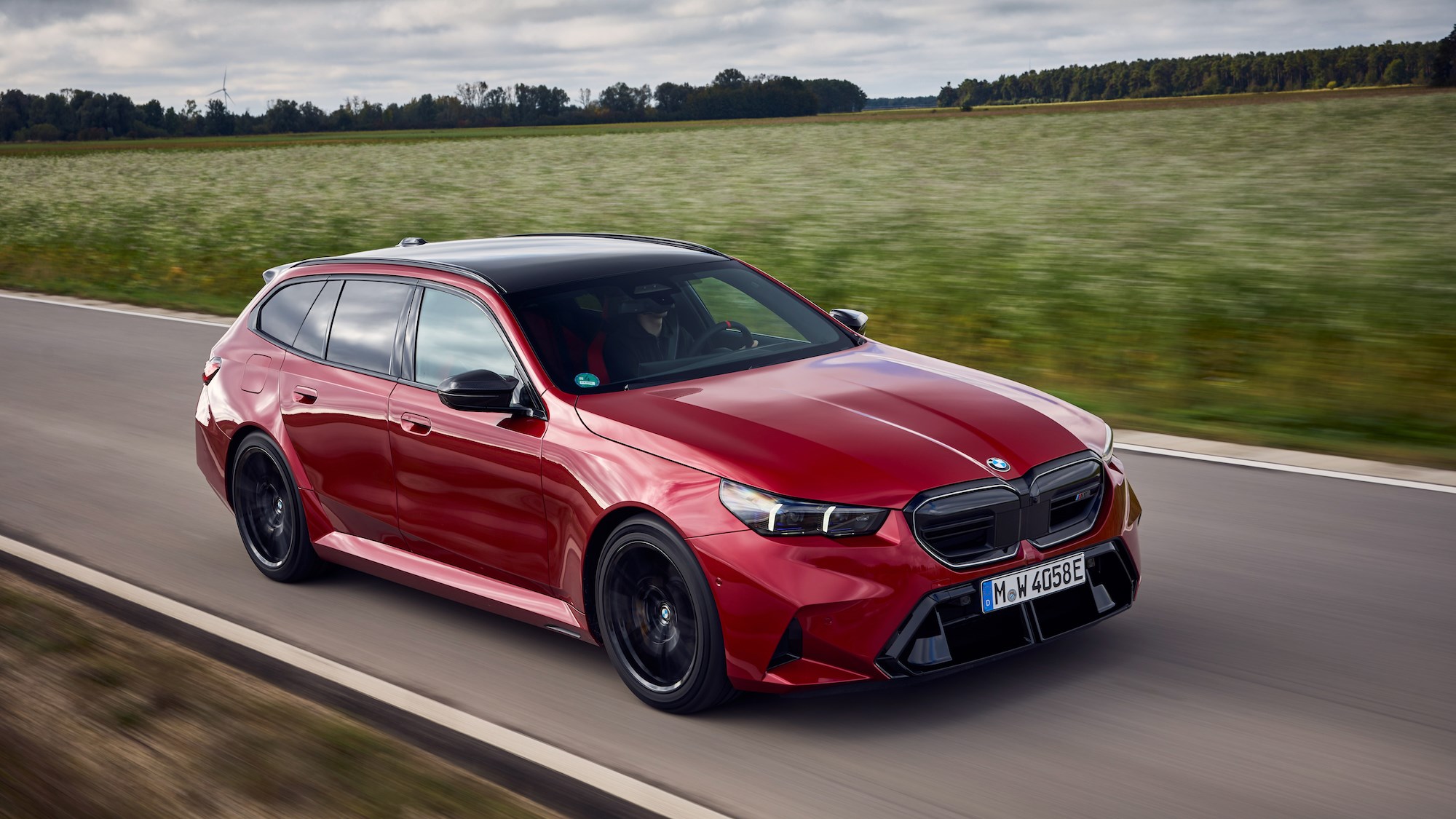
What’s new?
The M5 is all new heading into 2025 though chunks of it are familiar because it’s based on the regular G90 5-Series and i5 saloon and G99 Touring introduced last year. As with every M5 going back to the first one 40 years ago, the M team has set about delivering a car that blends almost supercar levels of performance with the kind of refinement you get in a luxury car. But this time there are some important differences.
One is the availability of a Touring body style, something BMW has only offered twice before, on the 1990s E34 and 2000s E61, and which has been absent from the M5 configurator in the UK since 2010. The return of the M5 wagon means BMW M now has two performance estate cars in its stable, the M3 Touring having now been on sale for a couple of years.
BMW has also opted to put more effort into making the M5s stand out form the regular 5-Series cars by adding flared rear arches for the first time. The extra girth gives the M5 some real visual attitude – and looks great with the Touring rear end – and allows a wider track for increased stability.
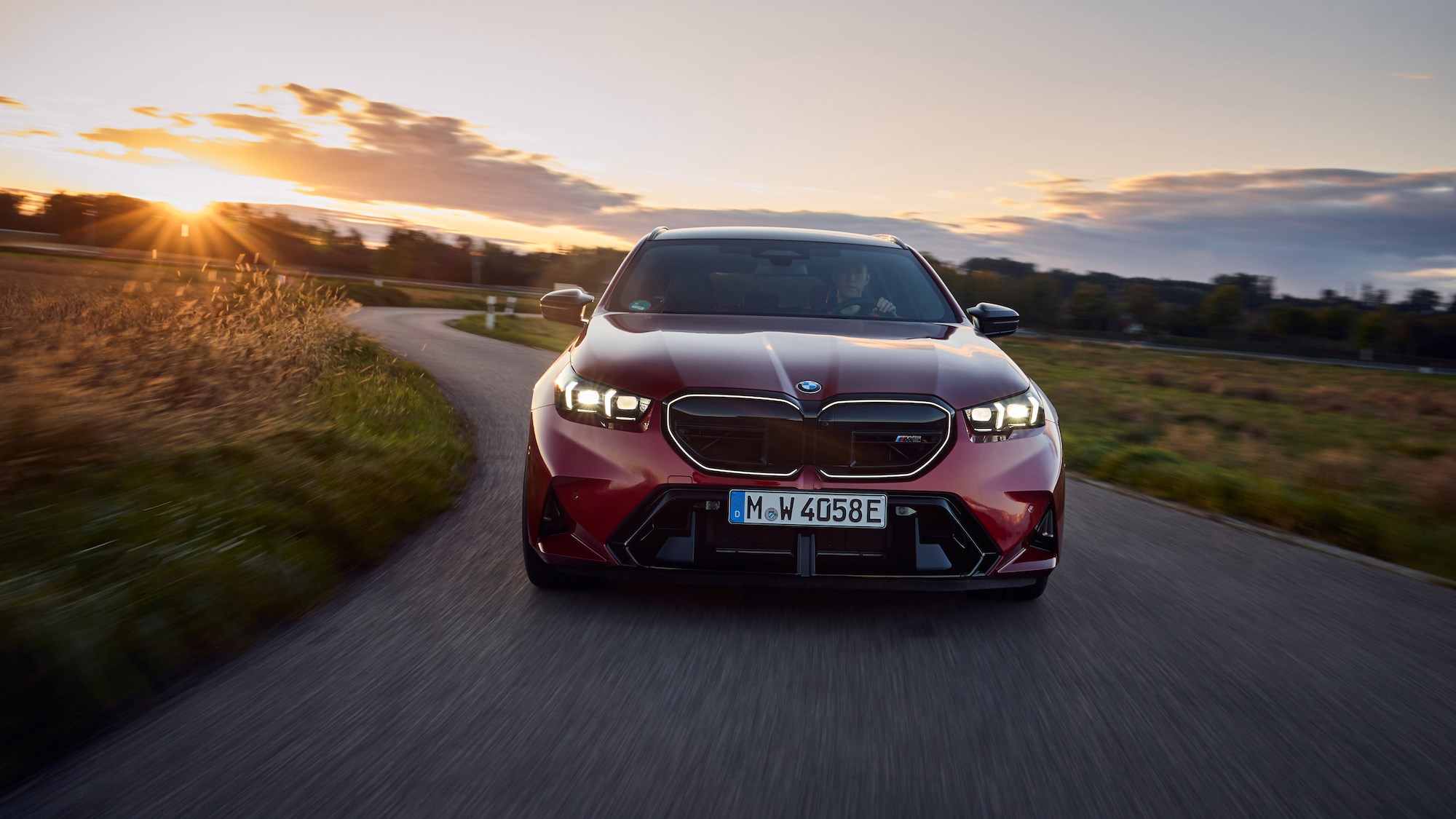
Arguably more important than both of those changes, however, is the new hybrid engine. It’s a PHEV system so can cover around 40 WLTP miles on electric power, makes the new M5 much cheaper to run as a company car than before, and delivers huge reserves of overtaking power.
What are the specs?
Rather than use the adoption of plug-in power as an excuse to downsize to six-cylinder power, BMW has retained the services of a V8 for the latest M5. The combustion engine makes a little less muscle than last time – 577bhp versus 617bhp – but it generates the same 553lb-ft of torque, and has the help of an electric motor stashed in the 8-speed automatic transmission to more than cover the shortfall.
The motor generates 194bhp and 207lb ft, though pre-stage gearing amplifies the available torque to 332lb-ft, giving a total system output of 717bhp and 738lb ft, which is delivered to all four wheels – or just the rears if you like. Big numbers, but so’s the one in the kerb weight column. BMW has kept the penalty for choosing the Touring body to 40 kg, but 2475kg is a hell of a lot, matching the BMW X5 M’s mass, for instance. The last M5 saloon weighed just 1895kg.
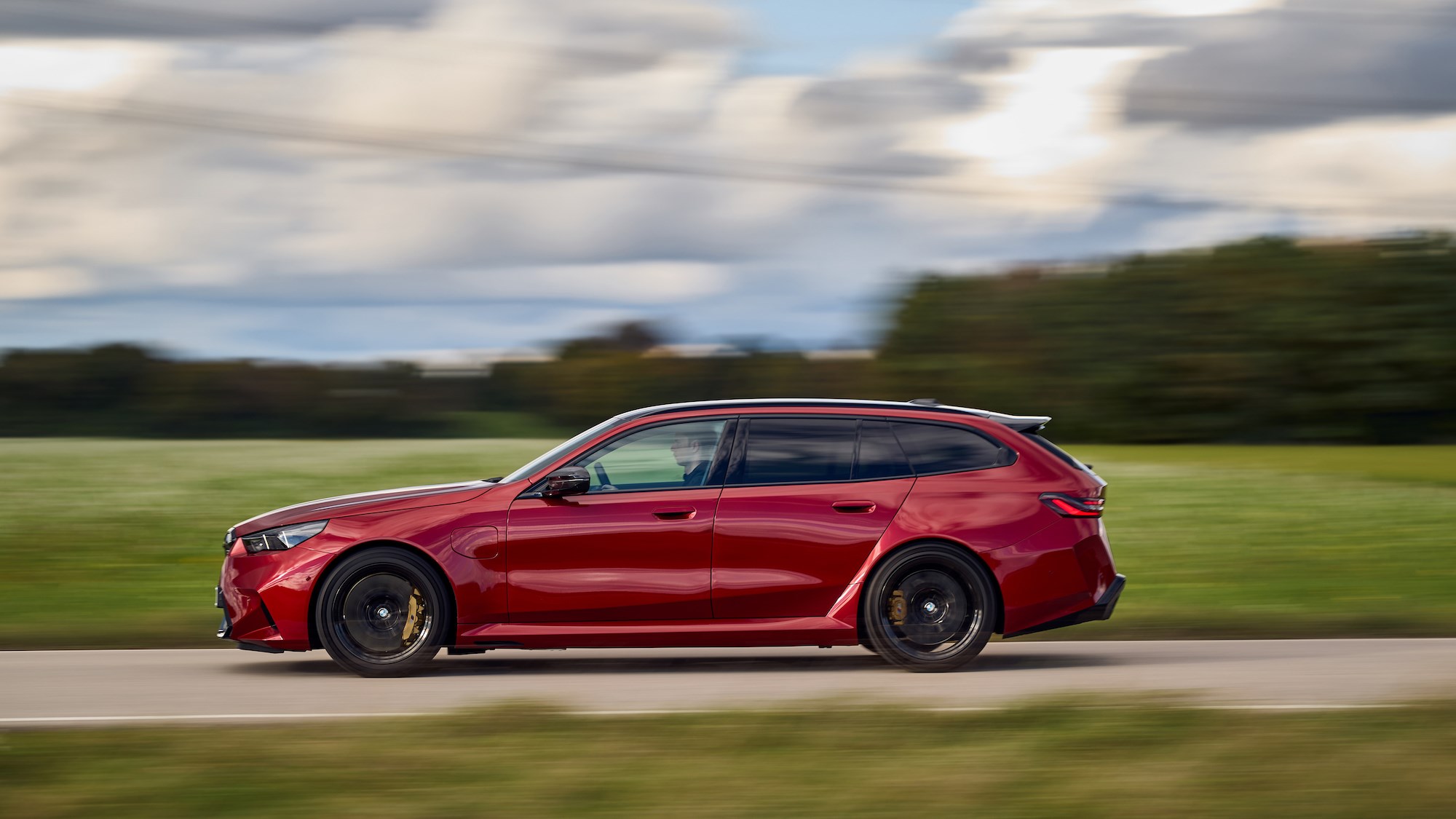
Going the Touring route slows the 0-62mph time to 3.6 seconds from the saloon’s 3.5 seconds, and that is two tenths slower than the M5 it replaces. You’ll also get slightly fewer miles from a full charge of the 18.6kWh battery mounted under the rear floor. BMW quotes a 37-41-mile range for the Touring and 39-42 for the three-box car.
How does it drive?
Like a much lighter car. We’d already discovered as much when driving the M5 saloon, and the Touring’s extra 40kg of a ballast isn’t much when the donor car already weighs 2435 kg. A track session would no doubt reveal some measurable difference, but there’s nothing about the way the Touring drives that would make you dismiss it in favor of the saloon.
It’s not that you’re never aware that you’re driving a big, heavy car, it’s that BMW’s chassis engineers have done and incredible job of making those occasions when you do notice few and far between. Whether you’re leaning on the front tyres – now 285 mm wide, up from 275 mm – or throwing the Touring through a tricky combination of corners, it never feels like its going to get away from you.
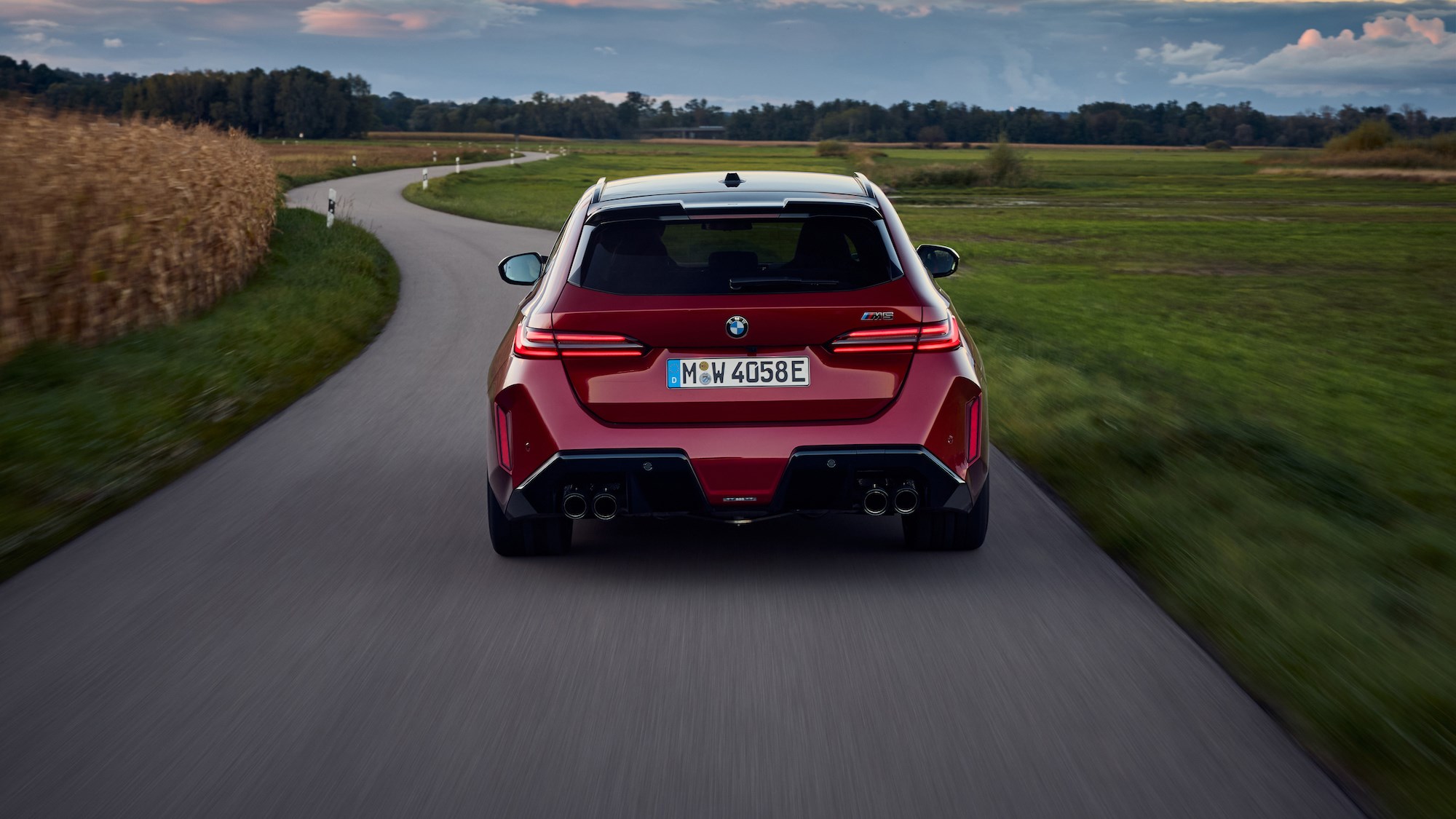
The steering precision, if not feel, encourages you to keep the pace up even on tighter sections, as do the brakes (we were on the optional carbon ceramics). Years ago M5s were chronically under-braked, but this one felt like it could take punishment for days. And it seemed more tied down at the back than the previous M5 on damp German roads.
Sticking to the default all-wheel drive setting adds to your sense of security, but the middle one of three settings sends a bit more torque to the rear and is noticeably more fun, though you’ll only feel the difference on really twisty sections. And you can still go bonkers and configure the M5 as rear-wheel drive.
Or just drive it in a perfectly sensible fashion and enjoy the mostly excellent ride comfort. More so than the M3, the M5 needs to deliver real refinement and a relaxing experience when you’re not trying to extract all 717 horses from under the bonnet. And it delivers.
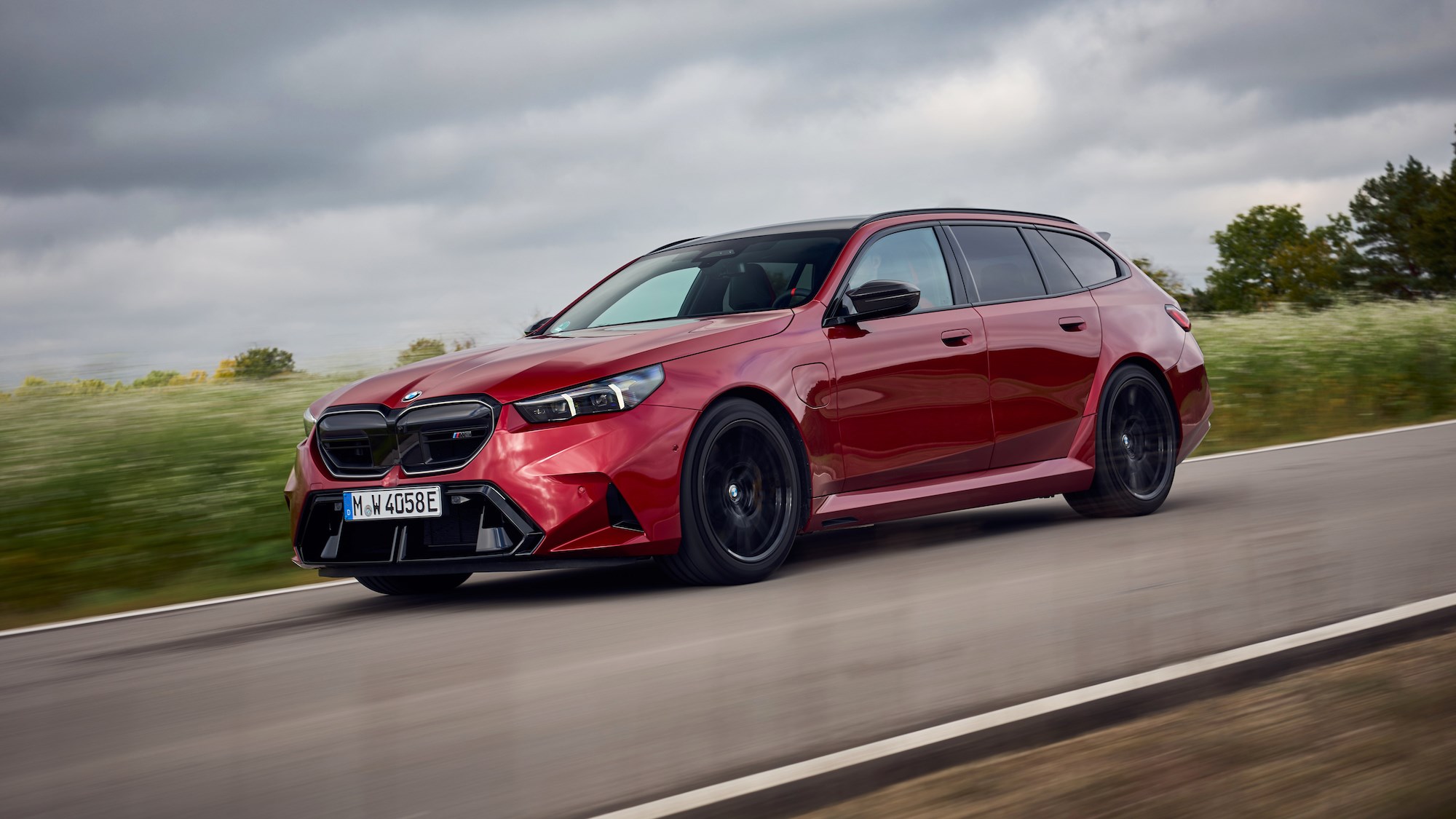
As for performance, the electric mode doesn’t have much. It’ll keep up with traffic, but is best reserved for traffic jams. But that doesn’t mean the electric motor is a waste of time. It helps mask the twin-turbo V8’s modest lag to deliver strong response to throttle inputs and epic mid- and high-speed acceleration. The zero to 62mph time might be worse than the old M5’s but this is a still a hugely rapid car, and one long lunge for the 155mph limiter (190mph as an option) will convince you that the new car is faster in real terms.
What’s the interior like?
If you like the M5 saloon’s interior – and we do – you’ll like the Touring’s driving environment because it’s almost identical. You get the same sports (but not too bolstery) seats, the same curved dash display and the same smattering of M5 cues, like the red starter button and the M1 and M2 buttons sprouting from the flat-bottom steering wheel that are used to call up your favourite drive mode settings. Of which there are far too many, so you’ll definitely want to spend some time storing your faves.
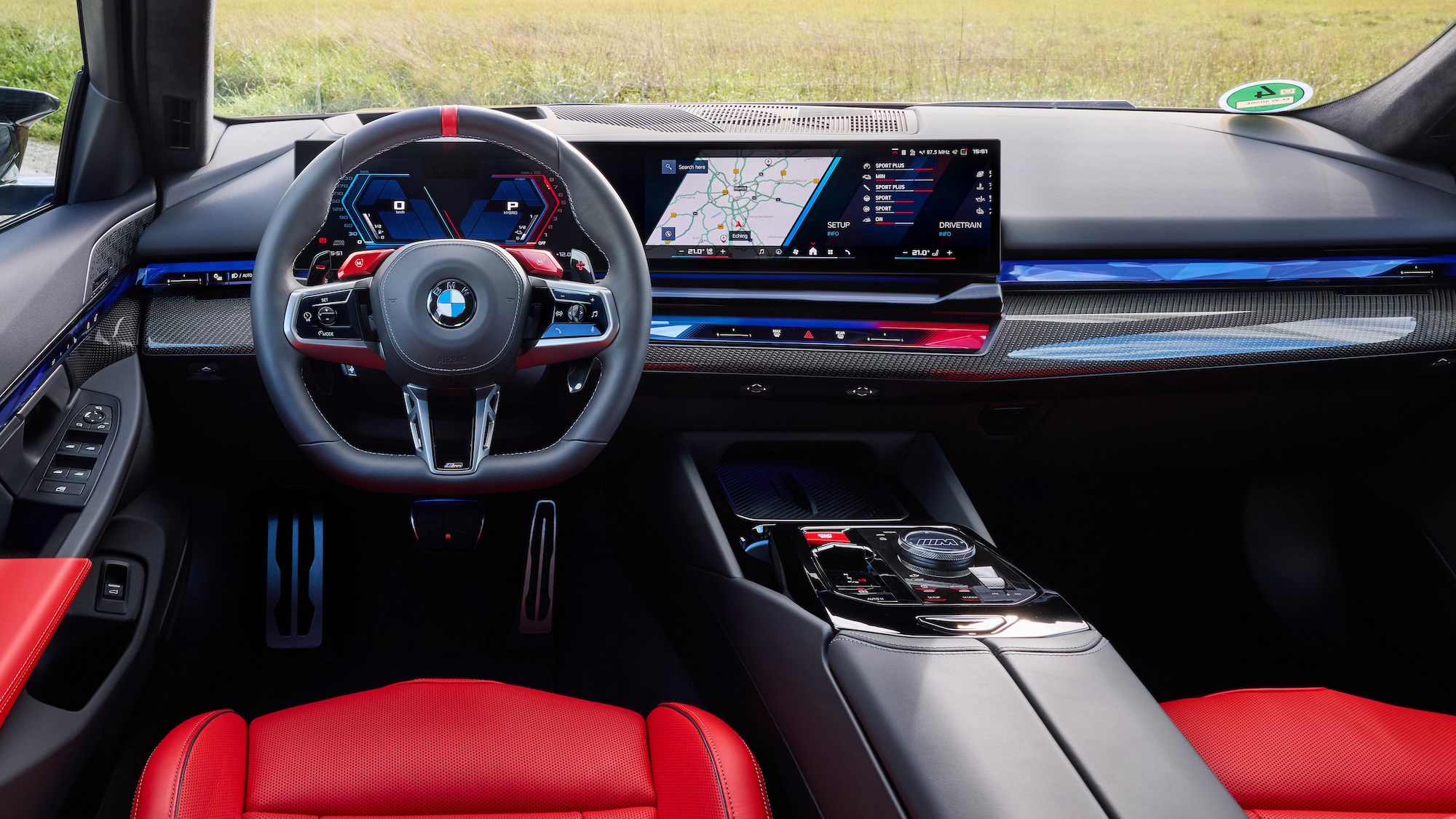
We’d expected to hear more road noise in the wagon, but I didn’t think it was noticeably worse. Maybe I was too busy thinking about the wind noise around the driver’s door glass that affects both cars. I noticed the same problem on the i5 so BMW this is clearly an issue with the entire 5-Series line.
What does separate the two M5s, of course, is the amount of clobber you can stash behind the second row of seats. The backrest splits and folds in both cars, but while the saloon limits you to 466 litres, the Touring offers 500 liters with the seats in place and 1630 with them folded down. That compares with 565/1680 litres for an Audi RS6 Avant and 650/1870 litres for BMW’s own X5 M – not class-leading then, but still useful.
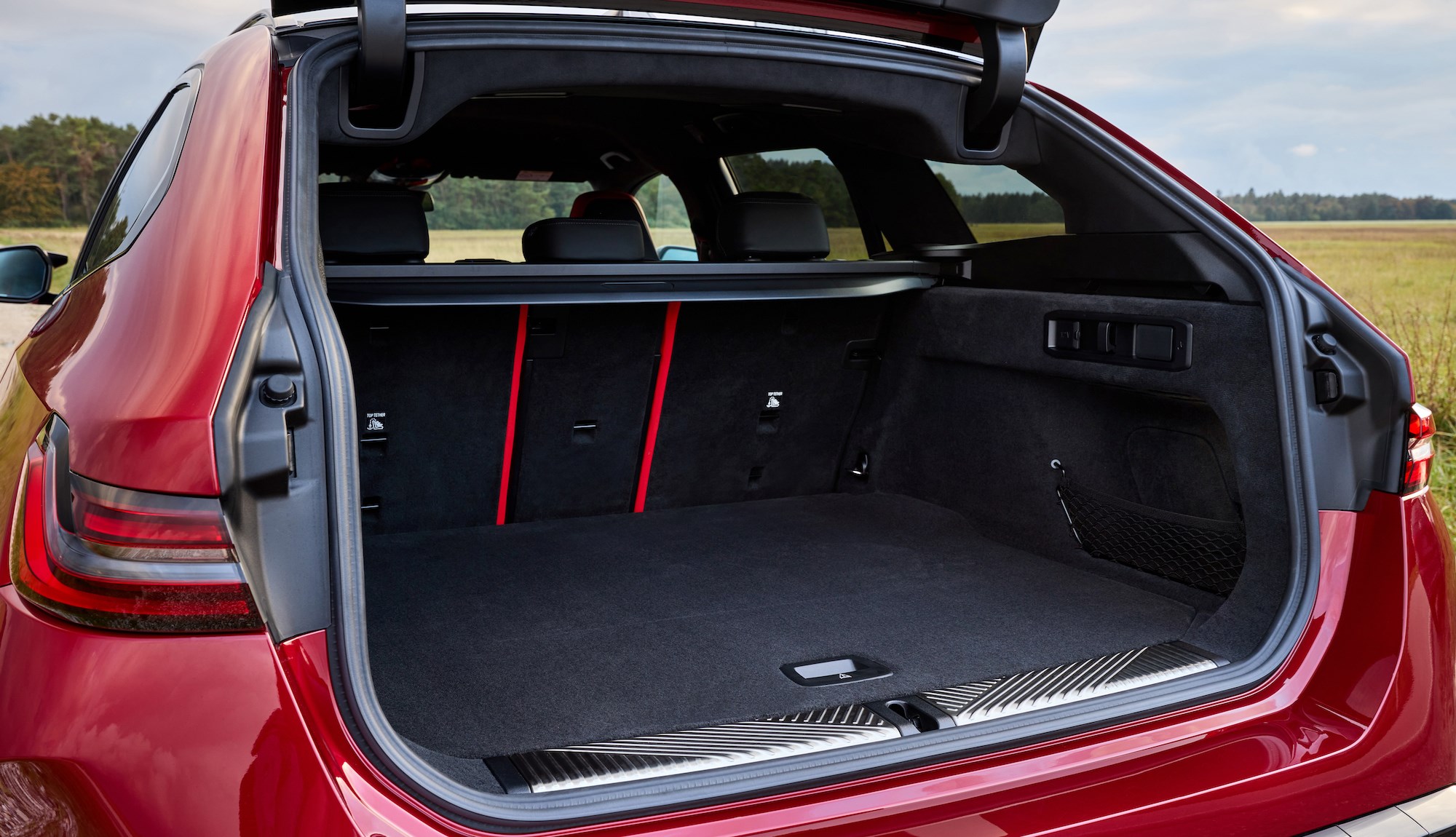
Before you buy?
There’s only a couple of grand between the £111,405 M5 saloon and the £113,405 Touring so not enough for price concerns to persuade you to pick one over the other. And BMW only sells the M5 in one spec for now, although we can probably expect to see a hardcore CS variant in a couple of years.
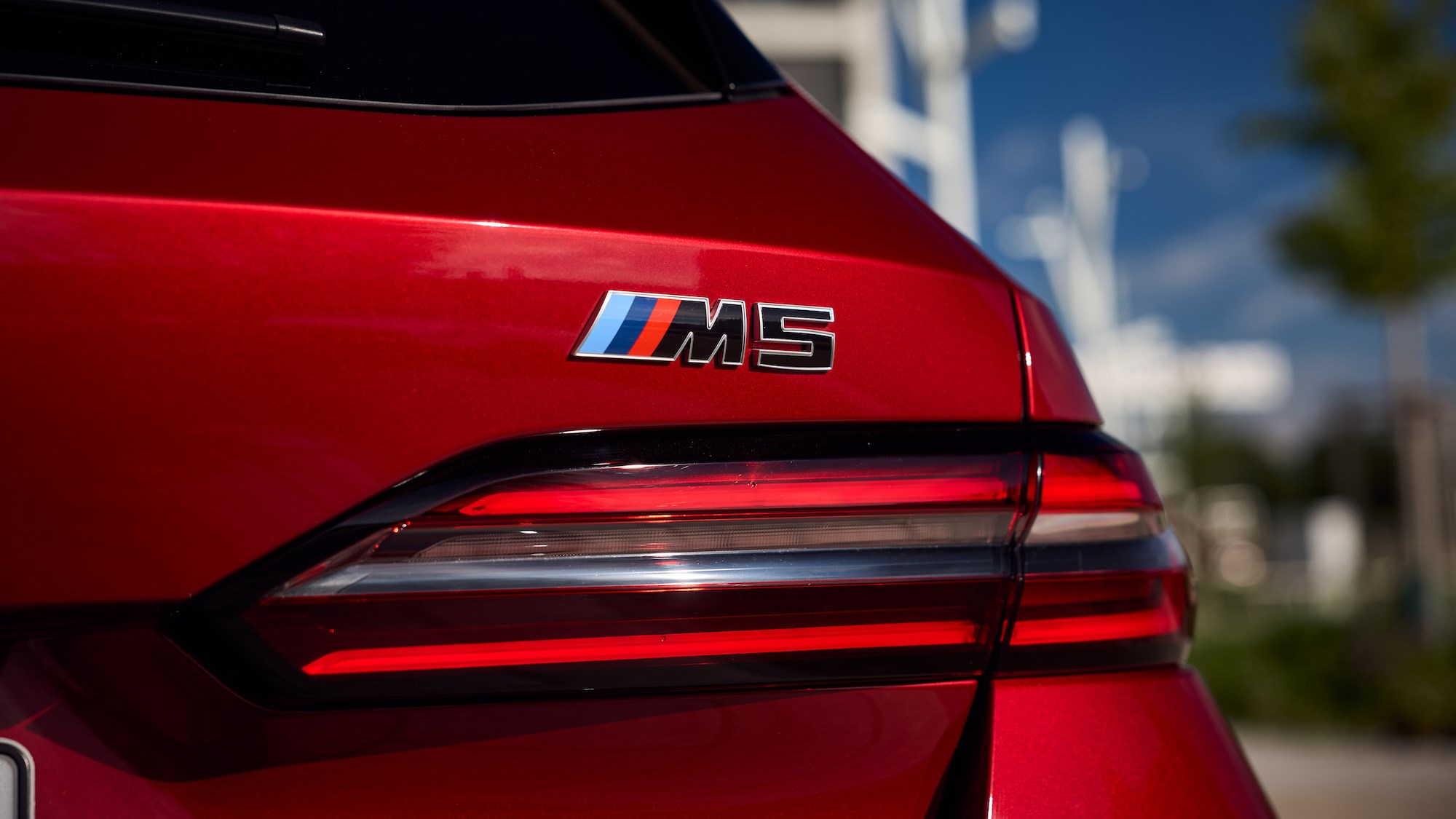
Looking for rivals throws up just a single direct competitor, Audi’s elderly RS6 Avant. That costs £116,120 in Performance trim, serves up 621bhp and gets to 62mph in 3.4 seconds. Or you can go for the retro-liveried GT model that’s limited to 660 units and hits 62mph in 3.3 seconds despite making no more power.
Mercedes-AMG hasn’t released its new E63 estate yet, but we can’t dismiss the idea of an SUV as an alternative. BMW’s 617bhp X5 M takes 3.9 seconds to reach 62mph and costs £128,845, making the M5 look good value. And you’d have to spend £139,100 on a Porsche Cayenne to match the M5’s power and acceleration.
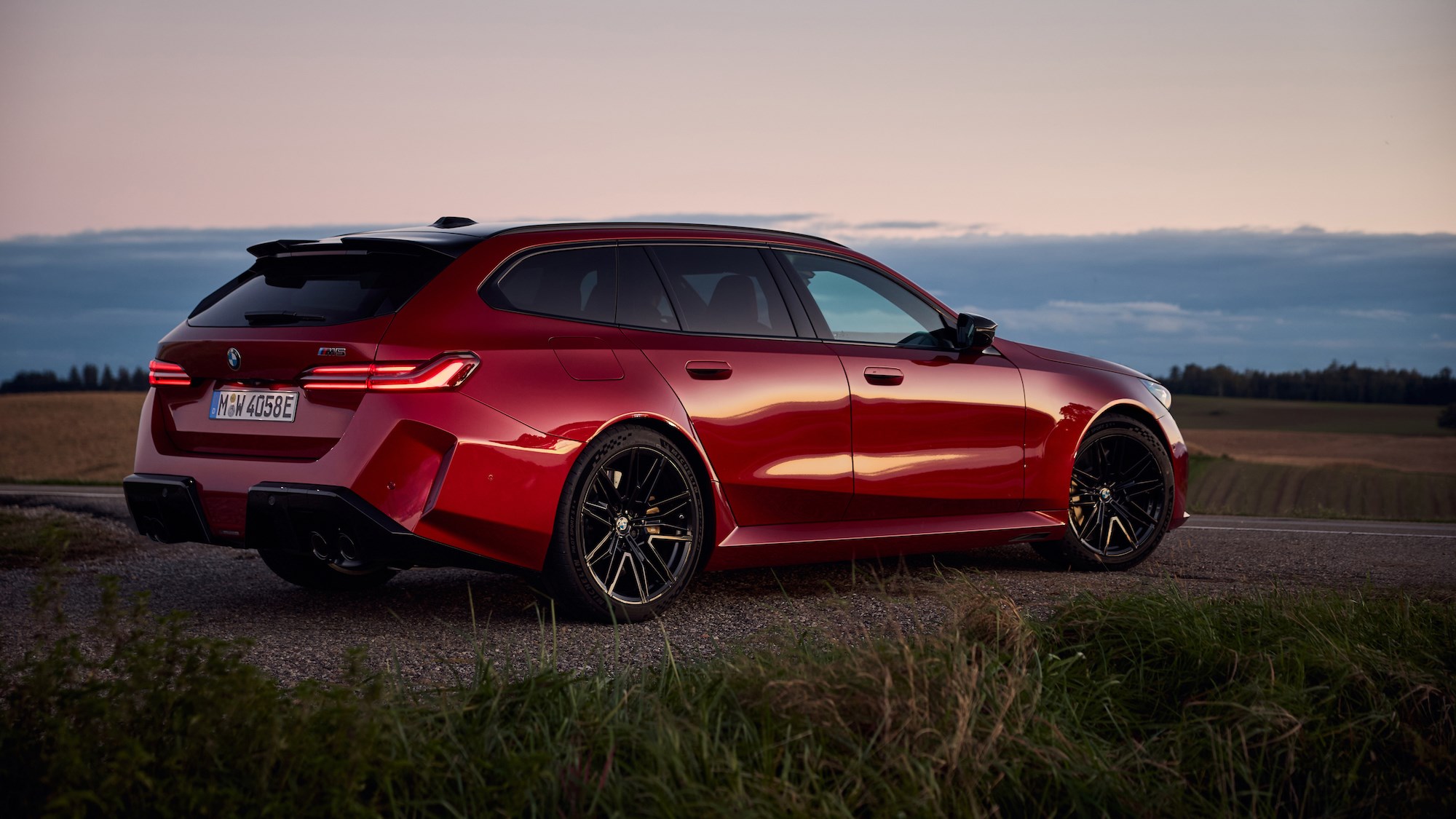
Verdict
The new M5 has come in for a lot of stick for the weight it’s piled on, and we’re disappointed in that spec figure, too. But the new M5 Touring is still lighter, cheaper and better to drive than the equivalent performance SUV, and it’s not noticeably less fun to drive than saloon, yet is more practical and much cooler. If you’re on-board with the whole concept of a PHEV M5 then the wagon is the one we’d recommend.